Bipolar Disorder in Teens: Early Signs and Treatment
Is Bipolar Disorder Common in Teens?
ALL TOPICS
- YouTube Parental Control
-
- How to see your YouTube history?
- What is Metaverse? Parent Guide
- Put parental controls on YouTube
- Delete TikTok Account without Phone Number
- Ways to block YouTube channels
- Ways to Get Somone's IP Address and Hide IP Address
- A complete guide on YouTube parental control
- What is Fanfiction? Parents Guide
- Kids safe YouTube alternative
- Top 5 TikTok Alternatives
- Methods to restrict YouTube adult content
- Social Media App Parental Controls
- Parental Control Tips
Sep 11, 2024 Filed to: Parent's Guide Proven solutions
Are extreme mood swings of your child bothering you? Usual ups and downs in behavior are normal during teenage development. But if the kid is always on edge and erratically switches from extreme temper to acute sadness every couple of days, they need help.
Bipolar disorder in teens is a common problem. Your kid isn’t the only one going through the issue. There has been a steep rise in depressive disorders, including bipolar disorder, over the last few years, with more than 17.4 million Americans falling prey to some form of depression each year.
Now, you might be wondering if your child can recover from this.
Thankfully, it is possible to manage the symptoms. Once you diagnose bipolar symptoms in teens and follow regular treatment guidelines, you can help your child get better over time. In the early stages, bipolar disorder can be effectively catered to at home. This post will equip you with all the knowledge you’ll need to pinpoint the symptoms, draw out a practical treatment plan, and help your teen break free from it.
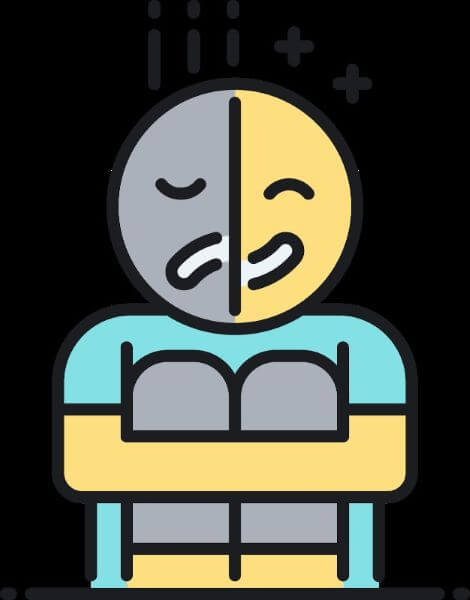
What is Bipolar Disorder?
Bipolar disorder is one of the several forms of depressive disorder. This medical disorder goes by many names besides bipolar disorder - bipolar affective disorder, bipolar mood disorder, manic disorder, manic-depressive illness, manic-depressive disorder.
A person exhibiting bipolar symptoms will experience drastic changes in their moods and energy levels. The sudden switch is usually between two states - manic and depression. Sometimes, people with bipolar disorder will feel extremely happy and will have much higher energy levels than usual. This is called a manic episode.
But here’s the kicker:
On other days, they’ll experience extreme sadness or depression, called a depressive episode. They'll show little activity on these days, showing little or no interest in even the things they usually like. In the worst cases, they may even start thinking about hurting themselves or committing suicide.
Bipolar disorder symptoms usually appear in later years of teenage or early adulthood. It affects the person’s personality, changing their sleep patterns, their interaction with others, and even their ability to think clearly. Teens with bipolar disorder will have a hard time performing well in school and getting along with friends.
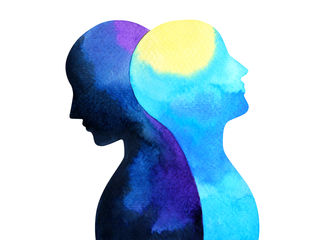
Early Bipolar Symptoms In Teens
To manage the symptoms correctly, it’s very important to understand what you’re dealing with. Parenting a bipolar teenager is only possible once you know the symptoms and can decide for sure if it's a bipolar disorder that you're dealing with or something else entirely.
Since bipolar disorder in teens appears in two extreme states, manic and depression, we will list down the symptoms separately. For a teenage bipolar test, look for these early signs:
1. Symptoms Of A Manic Episode

- Feeling very happy
- Feeling little need to sleep
- Increased energy levels
- Misbehaving
- Talking and thinking fast
- Impaired judgment
- Easily distracted
- Displaying overconfidence, and an increased sense of self-importance
- Reckless driving or other reckless behavior
- Thinking about sex or becoming unusually sexual
2. Symptoms of A Depressive Episode
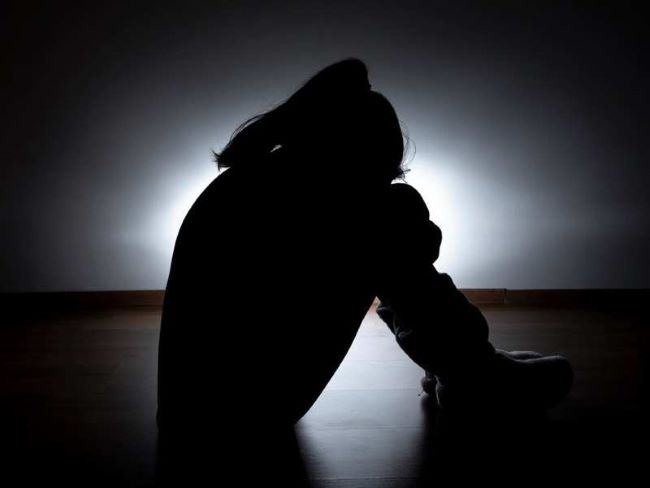
And it gets worse:
- Disturbed sleeping pattern - sleeping too much or too little
- Feeling extremely sad all the time
- Showing little or no activity or excitement
- Disturbed appetite - eating too much or too little
- Very little energy, easily fatigued
- Feelings of hopelessness or guilt
- Unusually anxious
- Inability to concentrate, poor performance in school
- Impaired decision-making
- Withdrawing from family and friends
- Thinking about suicide
Suicide Prevention
Though suicidal behavior may not appear in the early stages of the disorder, you should be aware of the worst-case scenario as a parent. If your child is thinking about hurting themselves or another person, consider it as an emergency. Call the National Suicide Prevention Lifeline at 800-273-8255.
Here’s the deal:
Until expert help arrives: listen to your child, don’t argue, judge, or yell - just listen. Make sure any guns, knives, or other dangerous equipment is out of the way.
What Are The Causes Of Bipolar Disorder
Bipolar disorder in teens may result from a single factor or a combination of factors. The exact cause of the bipolar disorder is still unknown, but here are the factors that can play a role:
● Genetics
Bipolar symptoms in teens are sometimes linked to genetics. In simple words, if your first-degree relatives (sibling or parents) have the problem, it is possible that you may experience the symptoms at some stage in life. There isn’t much information on the genes that may be responsible for triggering the problem, but researchers are working on it.

● Chemical Imbalance In Brain Cells
Chemical changes in the brain cells can also trigger the symptoms. Research suggests that an imbalance of neurotransmitters, or the chemicals that control the brain's functionality, can result in signs of bipolar disorder in a person’s behavior.
● Environmental Triggers
If a person is susceptible to bipolar disorder, a stressful life event can trigger the first episode. The death of a close relative, physical, mental, or sexual abuse, breaking of a relationship, or a traumatic event can initiate bipolar disorder in children. Drugs and alcohol can also trigger the symptoms.
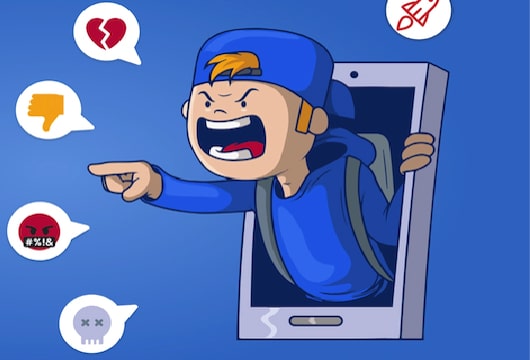
Want to know the worst part?
In this technological age, the overwhelming influence of social media and cyberbullying can also be largely responsible for depressive disorders. Being the parent of a teenager, you might already be aware of the vicious online predators out there. Sometimes, they can put a child through such levels of mental trauma that they can push the victim over the edge without even laying a finger on them.
Keep an eye out for the source of the problem. While you can’t do much about the genetics or biological traits of your child, you can protect them from environmental triggers. Be their friend, helping them deal with any mental stress before it takes a serious turn.
What Can Parents Do To Help Kids With Bipolar Disorder
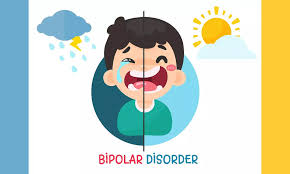
If your kid is displaying signs of bipolar disorder, there’s a lot that you can do to help them deal with the situation. While a complete cure for the disorder does not exist, changes in lifestyle, medication, and therapy can help a teenager manage the symptoms.
If you have a child with bipolar symptoms, don’t panic. You’ll need a clear, objective mind to handle the matter. The first thing you should do is talk to your family health care provider. Discuss the options and ask them to connect you to a good therapist - psychotherapy, psychosocial therapy (or family-focused therapy), and interpersonal therapy can prove helpful in dealing with the disorder. Sometimes, medication is also recommended.
Other than seeking professional help, here is a list of things you can do on a personal level to help your child through a stressful time:
1. Be Patient
It’s easy to get frustrated with a kid that shows extreme mood swings all the time. Put in extra effort to stay calm and patient so that your teen feels you’re on their side and not against them.
2. Encourage Conversation
Make your child feel comfortable with you and encourage them to talk about their feelings. Give them some slack, and don’t judge. Let them talk their heart out and listen with compassion. When your teenager feels that they’re being supported, it may help to calm them down.
3. Promote Treatment
Help your child develop a positive attitude towards treatment. Make them realize it’s good for them so they can open up with the therapist.

4. Build A Healthy Daily Routine
Maintain a daily schedule for your kid, with ample hours of sleep, a healthy diet, physical activities, and socializing with friends and family. Make sure the kid follows the routine and does not do too much or too little of any of the activities. Parents can use the parental control app like FamiSafe to help apply the schedule.
FamiSafe - The Parental Control App For Keeping Kids Safe From Cyberbullying
We’ve already highlighted how environmental factors can push the symptoms of bipolar disorder in teens. An important one is cyberbullying. If your child is already experiencing bipolar symptoms, online harassment can easily push them over the edge. If you’ve been researching, you might have come across several cases which ended with the victims of cyberbullying taking their own life.
Take action. Protect your child while there’s still time. FamiSafe can help you. Understanding a parent’s perspective and being aware of all the online threats, FamiSafe has created the most reliable and comprehensive parental control app. Not only does it help build a healthy routine for your child, but it will also safeguard them against online predators.
- Location Tracking & Geo-fencing
- App Blocker
- Web Filtering
- Screen Time Control
- Smart Parental Control Setting
Take a look at some of the features that help ensure that your kid is only engaged in healthy activities online:
- Website filter helps you block unsafe sources and view browsing history to see if the kid attempted to visit any dangerous website.
- Detect inappropriate pictures in the teen’s photo gallery so you can help them if they’re experiencing sexual harassment or porn addiction.
- Detect threatening messages on social media apps. You can add suspicious keywords, sexual, violent, or rude words, and get alerts if a message includes any of these.
- Location tracker, so you always know where your kid is. You can view their real-time location and see location history and ensure their safety.
So what’s the takeaway?
Being the parent of a teenager, you might be used to seeing some mood swings. However, if your child is showing unusual changes in behavior, don’t take it lightly. Bipolar disorder is a possibility. Bipolar disorder in teens can be managed if you diagnose the signs and start treatment early.

Ankhi Bhattacharya
contributor Editor